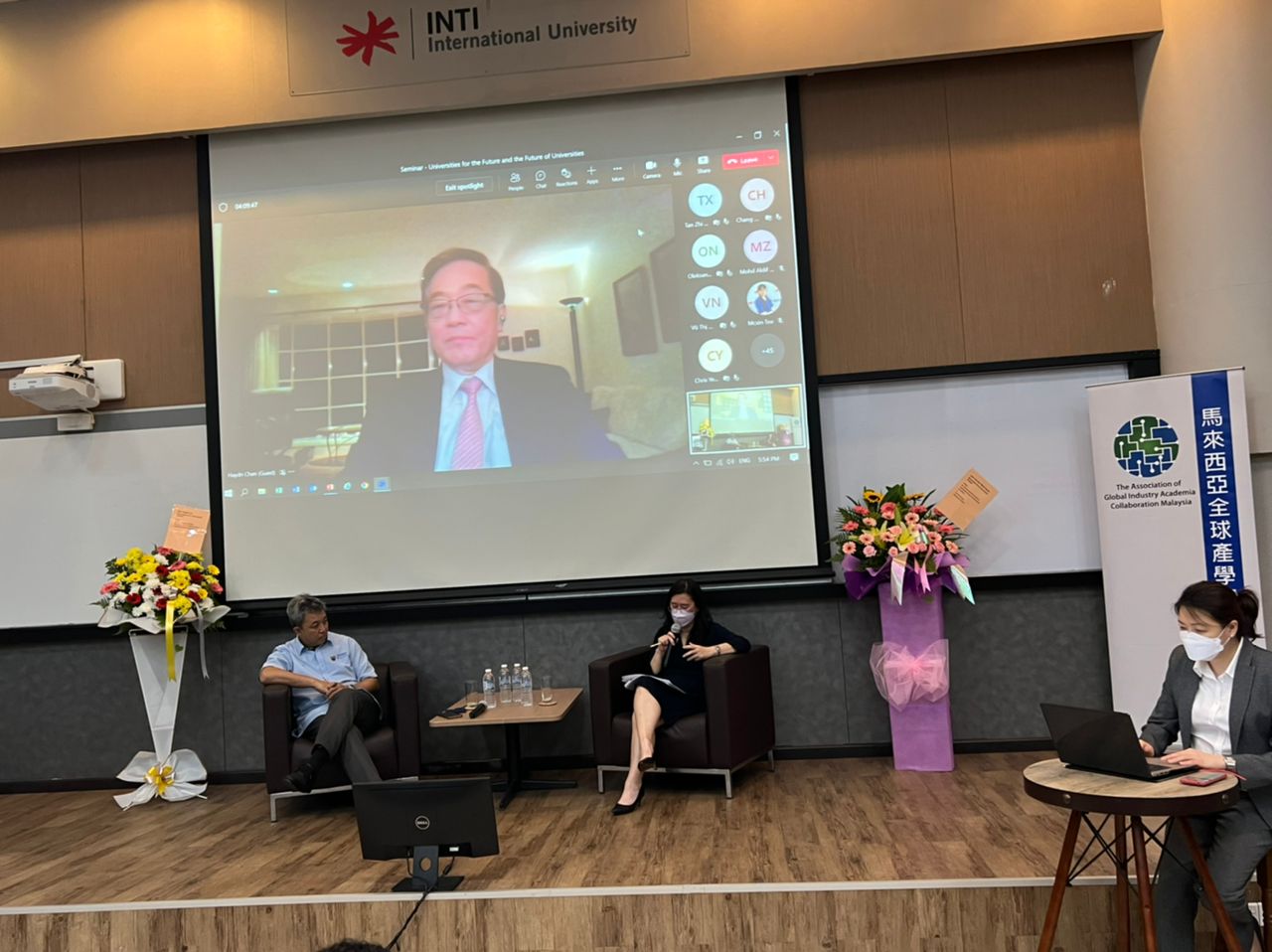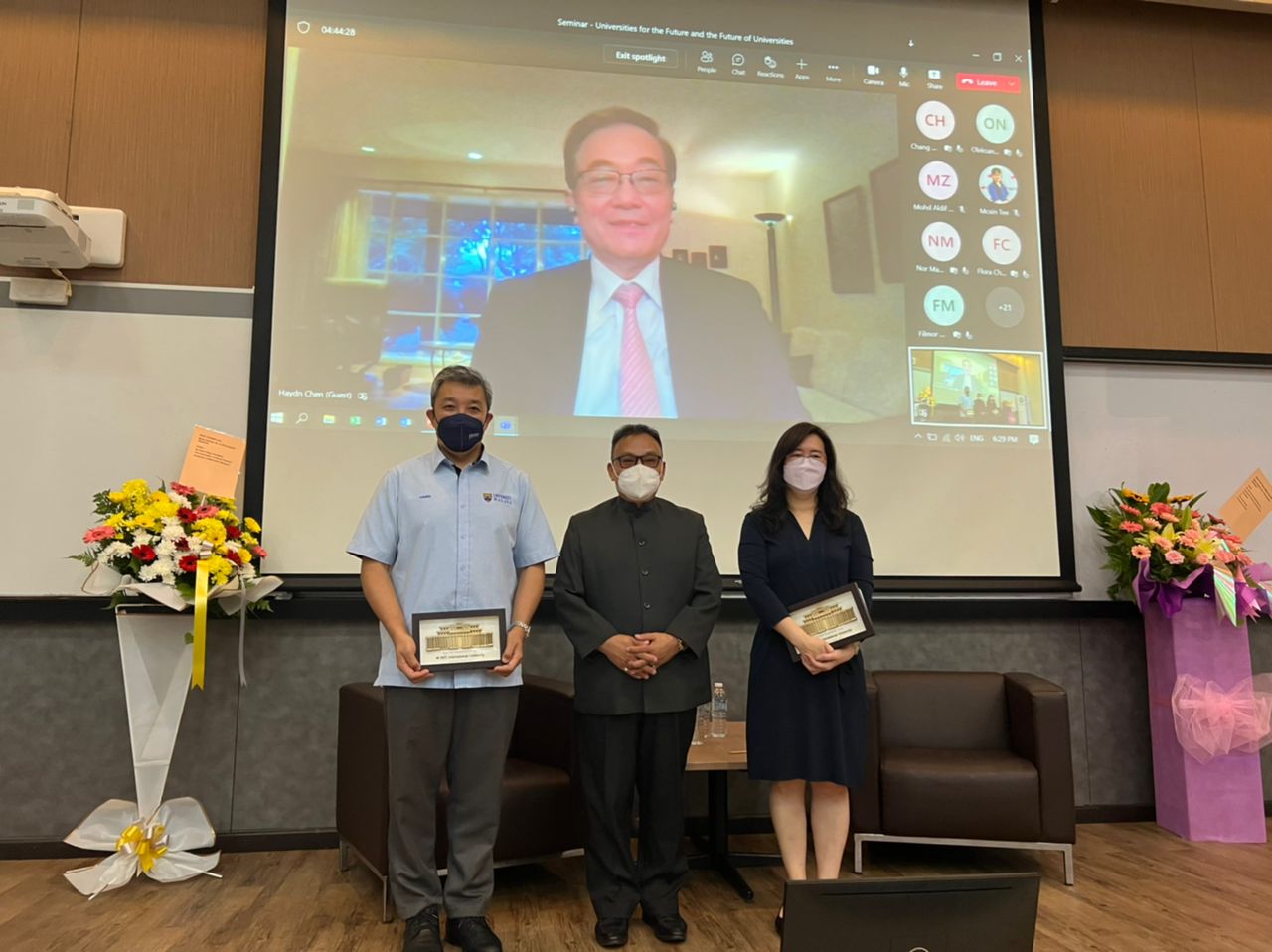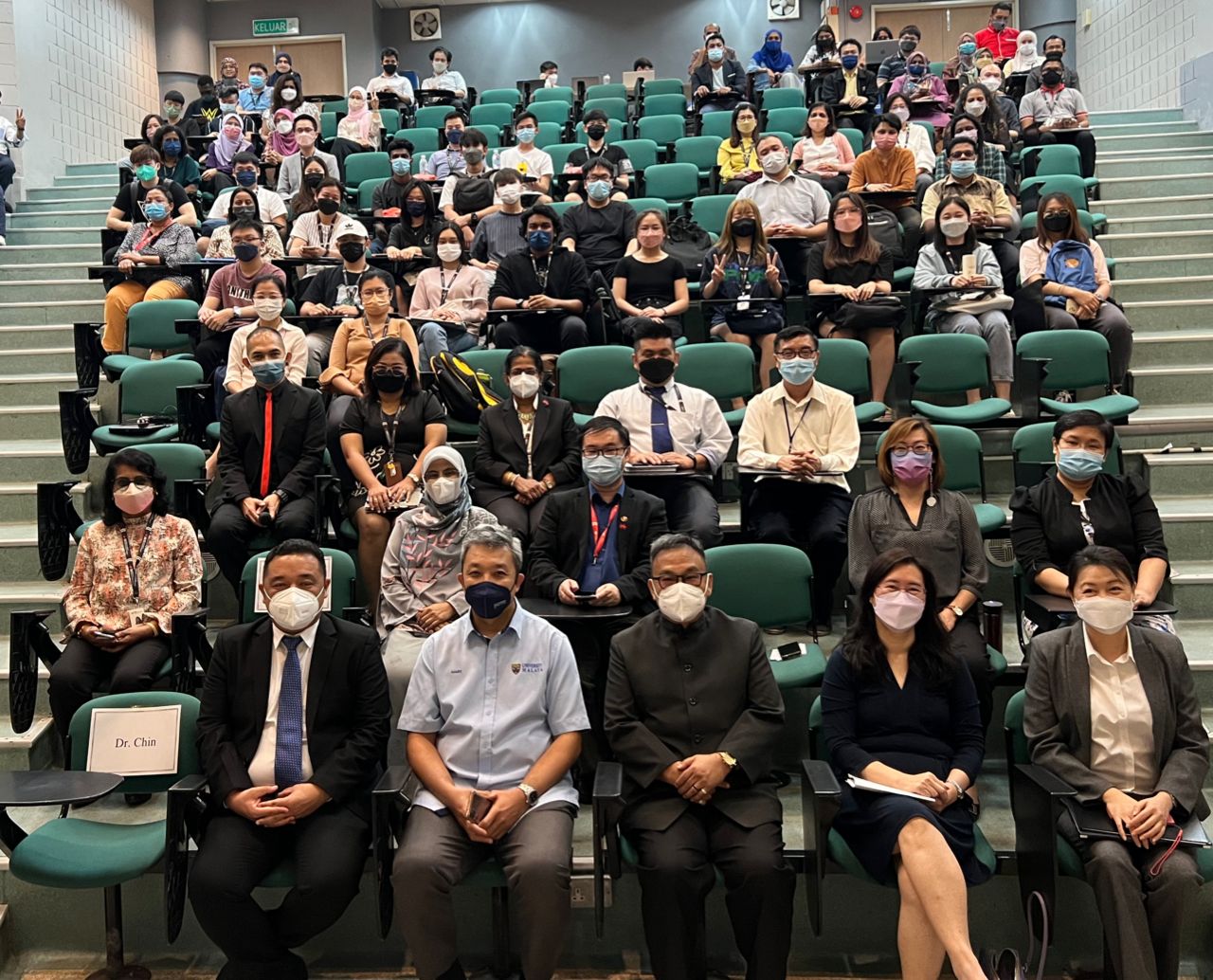As the world struggles to come out from under the shadow of the pandemic, higher education around the world is faced with enormous obstacles. COVID-19 moved teaching and learning activities online which opened great opportunities for innovation. Universities and colleges now need to see how the new normal will look like and how to remain relevant. To explore this further, INTI International University recently hosted a seminar titled “Universities for the Future and the Future of Universities” which highlighted the visionary foresight of Prof. Haydn Chen, Chief Strategy Officer of the National Yang Ming Chiao Tung University in Taiwan, and Prof. Datuk Ir. Dr. Mohd Hamdi Abd. Shukor, Vice Chancellor of University Malaya (UM).
During a forum session, both speakers shared insights on how universities are looking to change – giving their views on areas such as pedagogy and influence, students and making career decisions, as well as financing and implementation. Prof. Chen said there are three points to consider in the positioning of future universities namely curriculum programmes and degrees, teaching and learning methodologies, and nurturing soft skills in students. He said the goals and mission of the degree shapes how a degree programme is designed, and the courses and electives that a student should take.
 Prof. Datuk Ir. Dr. Mohd Hamdi Abd. Shukor (seated left), Vice Chancellor of Universiti Malaya, Tina Yeung (seated right), Country Director of SI-UK Malaysia, Dr. Lai Ying Ling (far right), Pro Vice Chancellor (Academic Operations) of INTI International University, and Prof. Haydn Chen (on screen), Chief Strategy Officer of the National Yang Ming Chiao Tung University, during the forum session.
Prof. Datuk Ir. Dr. Mohd Hamdi Abd. Shukor (seated left), Vice Chancellor of Universiti Malaya, Tina Yeung (seated right), Country Director of SI-UK Malaysia, Dr. Lai Ying Ling (far right), Pro Vice Chancellor (Academic Operations) of INTI International University, and Prof. Haydn Chen (on screen), Chief Strategy Officer of the National Yang Ming Chiao Tung University, during the forum session.“Every country is different and has different emphasis in terms of educational goals and requirements for its economic development. In Taiwan, there is an emphasis on cross disciplinary education because the many advanced technologies and developments require knowledge and skills that goes beyond just a single discipline. So, there are more and more majors and minors and combinations of both,” he said.
Prof. Mohd Hamdi said while there is no interference from the Malaysian government on how education is being delivered, the education landscape is changing. This requires universities to get staff to embrace new ways of teaching and thinking.
“We are going strongly with the flipped classrooms and problem-based learning, not teaching as how we have been doing for the past 100 years. We are changing the landscape. It is tough as some professors are reluctant to change, so we focus on the young ones and incorporate this in the KPI. Another way is to lengthen the tenure system. At Universiti Malaya, we want academics to become an Associate Professor after six years, failing which they must leave the university. This is a new model that we are enforcing as well as changes in teaching method and pedagogy,” he said.
On the type of talent that will be employed by universities in the future, both speakers acknowledged the need to bring in industry professionals to add value to the programmes offered and the graduates produced.
“UM now has a teaching track which is less than 10 per cent of the population and we are opening the industrial track as well to bring in the captains of the industry – the retired ones who want to become professors – but they will be professors of practice. We have been doing this now for the past two years, bringing in people from various backgrounds to enrich our teaching,” said Prof. Mohd Hamdi, adding that these industry professionals would not be focusing on publications but more on teaching and doing industry-relevant research.
Bringing in educators from the industry is not something new in Taiwan and the US, according to Prof. Chen. He said four top universities in Taiwan have created new types of colleges by combining industrial practitioners and academics.
“These colleges are supported by the government with funding from the Ministry of Education and the Ministry of Science and Technology. The essence of the college is to have teachers from the industry who have the same privileges and responsibilities to teach and to advise, as well as to lead the research. There will be even more engaging participation from industry practitioners in certain areas in these four universities identified by the government,” he explained.
In terms of finances, universities now also face challenges when it comes to funds and generating income to sustain themselves for the coming years. Because of this, Prof. Mohd Hamdi said universities need to look for ways to raise funds.
“When we look at the demography of students coming over to public universities, 60 per cent of them come from the B40 group, so you cannot raise the tuition fees. Therefore, university vice chancellors are now looking into businesses and all sorts of things. At Universiti Malaya, for example, we have our Open Channel, SATU, where students can enrol, and they have to pay their own. They are not government sponsored students and they pay full fees,” he shared.
 (From left to right) Prof. Datuk Ir. Dr. Mohd Hamdi Abd. Shukor, Vice Chancellor of Universiti Malaya, Dr. Joseph Lee, Vice Chancellor of INTI International University, Tina Yeung, Country Director of SI-UK Malaysia, and Prof. Haydn Chen (on screen), Chief Strategy Officer of the National Yang Ming Chiao Tung University, pose for a photo at the end of the hybrid event.
(From left to right) Prof. Datuk Ir. Dr. Mohd Hamdi Abd. Shukor, Vice Chancellor of Universiti Malaya, Dr. Joseph Lee, Vice Chancellor of INTI International University, Tina Yeung, Country Director of SI-UK Malaysia, and Prof. Haydn Chen (on screen), Chief Strategy Officer of the National Yang Ming Chiao Tung University, pose for a photo at the end of the hybrid event.Following points made in the presentations and forum discussion which clearly pointed towards imminent changes in the way students will study at universities, a question was raised on whether there is a need to review how children should be taught. Both Prof. Mohd Hamdi and Prof. Chen agreed that as universities start changing, it is good to also implement changes earlier in school.
“The technique of teaching where one person is standing in front and spending 40 minutes of an hour listening, then after four years we expect those sitting in front of us to have soft skills. Four years of listening with a little bit of interaction here and there will never change the behaviour of a person. We will never change the capacity and ability of the person to have communication skills, confidence, leadership, and all that we have been listing as necessary core competencies and soft skills. The way we teach does not commensurate the output we want,” said Prof. Mohd Hamdi.
Prof. Chen, who was of the same opinion, added that universities should emphasize more on campus life – paying attention to learning and activities outside the classroom.
“Universities should also have programmes not only for curriculum, for the disciplines, but also outside the classroom. They may become required for social responsibility, internationalization, and communications. All these elements should be built into the programme as part of its requirement rather than just the courses,” he said.
Meanwhile, in his closing remarks, INTI International University vice chancellor Dr. Joseph Lee said the conversation on the future for universities is a timely one, especially after the struggles and disruption by the pandemic proved that time is changing extremely fast.
“We need to react to it and think about how we can respond to the change quickly. We need to understand how we can progress in these challenging times. The future is nearer than we think, so it is now that we need to prepare ourselves,” he said.
Dr. Joseph added that while we are unable to predict the uncertainties, we need to be able to embrace all the possibilities and get ready because that is the responsibility of higher education.
He said, “We need to educate and prepare our students for a future where they will be facing jobs that are not even created yet. They will be using technologies which have yet to be invented and they will be facing questions which we do not anticipate today. The sharing from today about leading universities gives us inspiration. Universiti Malaya is exemplary for us in the country.”
For a young and emerging university like INTI and similar institutions of higher learning, looking into the future is just like looking into the sky and looking at the stars which may at first make us dizzy, but it is important to also put our feet on the ground to achieve greater heights, concluded Dr. Joseph.
 (From left to right, front row) Chong Kok Wai, CEO of INTI International University & Colleges, Prof. Datuk Ir. Dr. Mohd Hamdi Abd. Shukor, Vice Chancellor of Universiti Malaya, Dr. Joseph Lee, Vice Chancellor of INTI International University, Tina Yeung, Country Director of SI-UK Malaysia, Dr. Lai Ying Ling, Pro Vice Chancellor (Academic Operations) of INTI International University, and participants of the “Universities for the Future and the Future of Universities” seminar pose for a group photo.
(From left to right, front row) Chong Kok Wai, CEO of INTI International University & Colleges, Prof. Datuk Ir. Dr. Mohd Hamdi Abd. Shukor, Vice Chancellor of Universiti Malaya, Dr. Joseph Lee, Vice Chancellor of INTI International University, Tina Yeung, Country Director of SI-UK Malaysia, Dr. Lai Ying Ling, Pro Vice Chancellor (Academic Operations) of INTI International University, and participants of the “Universities for the Future and the Future of Universities” seminar pose for a group photo.